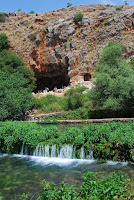"For My people have committed two evils:
They have forsaken Me, the fountain of living waters,
And hewn themselves cisterns—broken cisterns that can hold no water."
In Israel, water is a rare commodity with only two sources. The first source is rain which typically falls in the mountains during the short rainy season and then trickles down to through the valleys in streams called wadies. The ancients built aqueducts to redirect this rainwater to cities, pools and in-ground cisterns hewn out of rock and stone. The water was not cool, fresh or clean but it was wet and would due for their needs. The cisterns would provide a place where sediment could settle out and people could find water for cooking, drinking and watering. A cracked or broken cistern didn't hold water for long. Slowly, water would leak and seep out and the owner may never even realize it.

This is a cistern at Herodium, the palace of Herod the Great, just south of Bethlehem. Water was diverted from the hills of Jerusalem down to Bethlehem via aqueducts and eventually to Herodium to this cistern. This was a very large and impressive cistern that could have held three buses stacked. The stairs are so that servants could collect water as the level dropped during in the non-rainy seasons.
The second source of water in Israel is the spring. There are many springs in the far North near Dan and Mount Hermon. This area is lush and green and never lacks vegetation or fresh, cool and clean drinking water. There are a few springs in Judah as well but they are not as abundant. Where there are fresh water springs central and southern Israel we find wells. Jacobs well in Sychar in Samaria was a good example of a well spring (John 4). This is where Jesus spoke of living water that only He could provide. I wonder if He had this passage in mind as He said that to the Samaritan woman? Another example would be the well of Elisha in Jericho which spoiled but Elisha made well (2 Kings 2:19-22). Perhaps the most famous and important spring in Israel would be Gihon at the base of the city of David in Jerusalem that feeds the pool of Shalom. This is the spring that David used to enter Salem and overthrow the people to make Jeru-salem his capital. This same spring Manassah walled in to protect it (2 Chron. 33:14) and Hezekiah diverted via a tunnel under the city to a pool withing the walls (2 Kings 20:20 2 Chron. 32:30).
 This is the spring at Cesarea Philipi just south of Mount Hermon and North of Galilee.
This is the spring at Cesarea Philipi just south of Mount Hermon and North of Galilee. This is the spring at Gihon on the South end of the City of David in Jerusalem. Just as it says in 2 Chron. 32:30, the spring and the tunnel still work to this day. You can walk down into the spring cool, fresh and clean water and through the tunnel all the way to the Southwestern corner of Jerusalem.
This is the spring at Gihon on the South end of the City of David in Jerusalem. Just as it says in 2 Chron. 32:30, the spring and the tunnel still work to this day. You can walk down into the spring cool, fresh and clean water and through the tunnel all the way to the Southwestern corner of Jerusalem. This is simply a memorial that stands in Jericho where the story of Elisha's well is still remembered and celebrated.
This is simply a memorial that stands in Jericho where the story of Elisha's well is still remembered and celebrated.God is a fresh, clean, cool spring that brings life, health, growth, joy and peace. He is a never-ending source of life that we must guard and protect and cherish. (Prov. 4:23)




No comments:
Post a Comment